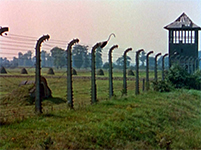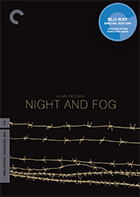Night and Fog (Nuit et brouillard)
|  Of all the films made about the Holocaust, Alain Resnais’s Night and Fog (Nuit et brouillard) is quite possibly the most moving and thought-provoking, which is all the more impressive given than it is barely more than a half an hour in length. As a visual document of the remnants of Nazi concentration camps, it makes an ironic statement about the inherent neutrality of physical objects until put into service by human agency for good or evil. As a historical portrait of the lowest depths of humanity, it universalizes a specific moment in history and opens it up for multiple readings, the most often overlooked being the connections between what the Nazis did to the Jews and what the French colonials did to the Algerians. Of all the films made about the Holocaust, Alain Resnais’s Night and Fog (Nuit et brouillard) is quite possibly the most moving and thought-provoking, which is all the more impressive given than it is barely more than a half an hour in length. As a visual document of the remnants of Nazi concentration camps, it makes an ironic statement about the inherent neutrality of physical objects until put into service by human agency for good or evil. As a historical portrait of the lowest depths of humanity, it universalizes a specific moment in history and opens it up for multiple readings, the most often overlooked being the connections between what the Nazis did to the Jews and what the French colonials did to the Algerians.At the time, Resnais was known primarily as a Left Bankp-associated editor and documentarian, and he was still several years away from jump-starting the French New Wave with Hiroshima mon amour (1959). He structured Night and Fog around the fragility of memory, a theme that would haunt his subequent feature films, particularly the enigmatic Last Year at Marienbad (1961). Working with cinematographers Ghislain Cloquet and Sacha Vierny, he contrasts color footage of the Nazi concentration camps a decade after the end of World War II with scratchy black-and-white footage from the war years, resulting in a stark visual divide that makes ten years seem like a hundred … or a thousand. The crumbling, generally nondescript red brick buildings of the camps could be anything anywhere, but when put in contrast with the historical footage, they take on an air of impending doom—the bricks themselves seem poisoned with bad memories. Much of this is pointed out in the spare, often lyrical narration by Jean Cayrol, a poet and member of the French resistance who survived two grueling years at the Gusen concentration camp, which is spoken by prolific French actor Michel Bouquet, who later worked on several of Claude Chabrol’s films. But, it is the images themselves and the manner in which they are juxtaposed that speak the loudest. Working with historical consultants Olga Wormser and Henri Michel, Resnais carefully selected and incorporated stock film footage and still images from the camps, some of which are immediately recognizable (the iconic image of a small, still unidentified boy holding up his arms at Nazi gunpoint during the Warsaw Ghetto Uprising, for example) and others of which are not. Each image, though, has a profoundly disturbing effect, conveying in the starkest terms the horrifying nature of human atrocity. Again and again we are pummeled with images that simultaneously beg us to look away and taunt us to keep looking, all of which are set to Hanns Eisler’s sometimes ironic, sometimes momentous orchestral score. The film gets steadily more violent as it progresses, with images of arrested citizens in the streets giving way to images of starving prisoners giving way to images of charred bodies, dismembered heads, and footage of dozens of rag-doll bodies being bulldozed into a mass grave. Some of the images have an abstract, almost surreal quality, the most memorable being footage of a roomful of shaved human hair, the obviously enormous dimensions of which are impossible to discern. As many have pointed out, Night and Fog consistently avoids equating the Holocaust with the Jews, instead turning it into a more universal atrocity that affected all of humankind. There have been various theories as to why this was the case, and Resnais himself has said in interviews that he wanted to make a connection between the Holocaust and other ongoing forms of violence, oppression, and genocide, including the French treatment of Algerians, without being explicit (the dire legacy of French colonialism had already been the subject of his 1953 short documentary Statues Also Die [Les statues meurent aussi], co-directed with Chris Marker and Ghislain Cloquet, which argued that significance of African art has been destroyed by French colonialism and its commercial imperatives). Some have seen this as a weakness in the film—a denial of sorts. While such arguments have merit, they ultimately boil down to the idea that the Holocaust should always be represented in a particular way, which is dangerously limiting. An event so earth-shattering can only exist in memory through multiple means of representation, some broad and others more narrow and specific in addressing the centrality of Jewishness. Resnais’s film obviously leans toward the broader form of representation, showing us that the mass murder of millions, regardless of religion or ethnicity, is a scar that everyone bears because, ultimately, we are all part of the human race. Footage of Nazis at the Nuremburg Trials denying their complicity becomes only one moment in the larger history of denial, one that still goes on to this day (for that reason alone, Night and Fog is still a crucial film with much to teach us). For Resnais, the worst thing imaginable about the Holocaust was how it was being denied and forgotten, even as it shadow still loomed. What Night and Fog most powerfully evokes is the importance of remembering that which we would be most comfortable forgetting. It’s a modern evocation of the well-worn adage “Those who forget the past are doomed to repeat it.” Not surprisingly, near the end of Night and Fog, the narrator asks the most chilling question of all: “Could this happen again?”
Copyright ©2016 James Kendrick Thoughts? E-mail James Kendrick All images copyright © The Criterion Collection | |||||||||||||||||||||||||||||||||||
Overall Rating: 


 (4)
(4)


